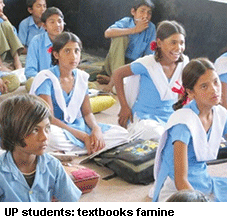 If chronic teacher absenteeism and pathetic infrastructure were not enough, children in Uttar Pradesh’s 169,000 government primary and upper primary schools are experiencing a chronic shortage of textbooks, seven months into the academic year. Classes I-VIII students are yet to receive the full complement of textbooks which the state government is obliged to distribute to them free of charge under the Right of Children to Free & Compulsory Education (RTE) Act, 2009.
If chronic teacher absenteeism and pathetic infrastructure were not enough, children in Uttar Pradesh’s 169,000 government primary and upper primary schools are experiencing a chronic shortage of textbooks, seven months into the academic year. Classes I-VIII students are yet to receive the full complement of textbooks which the state government is obliged to distribute to them free of charge under the Right of Children to Free & Compulsory Education (RTE) Act, 2009.
On October 17, a bench of the Allahabad high court called for details of textbook distribution across the state. Commented a two-judge bench of Justices A.P. Sahi and D.K. Upadhyay: “…it has also been indicated that the process of distribution of the books is still on. We cannot appreciate such a situation. The academic session as per the scheme of the state government itself starts from April 1 every year. Six months’ time has already elapsed since the academic session commenced and till date, the total number of books has not been procured, what to say about their distribution.”
Two days later, the government admitted before the court that only 69 percent of the required textbooks have been distributed thus far. Even this inadequate figure was questioned by the petitioner (Sarva Seva Trust) who claims a mismatch of 12-60 percent between the number submitted by the government and of the trust, which conducted a survey in two divisions of Basti and Gorakhpur districts. In Gorakhpur, while the government claims 58.7 percent of the required textbooks have been procured and distributed, the trust’s survey indicates 39.5 and 32 percent respectively. According to the petitioner trust, prior to the start of the academic year 2016-17, 100 million textbooks should have been printed and distributed, of which a mere 8.43 million books have been delivered to students, i.e, only 8.08 percent.
While the court has asked for a detailed list of textbooks distributed — with supportive evidence — by the state government in all of UP’s 75 districts to be submitted by November 11, mid-term exams have already been held in 169,000 government and aided schools statewide with the majority of students never having seen textbooks prescribed for study. Under the state government’s rules and convention, class I-V children are expected to receive a total of 30 books (including 10 workbooks) each, and class VI-VIII students 40 books. The State Text Book Office, housed within the Directorate of Basic Education, bears the responsibility for printing textbooks.
Assuming a modest average paper and printing cost of Rs.30 per primary textbook, the minimum expenditure incurred by the state government on 100 million textbooks is Rs.300 crore. Therefore, if 90 million books haven’t been printed at all, the loss to the state government aggregates a massive Rs.270 crore. And if figures are fudged to indicate an inflated number of printed and distributed books, kickbacks paid to UP’s notoriously venal bureaucrats — a distinct possibility — could be enormous. Comments Shashank Singh, advocate for the petitioner trust: “This is a blatant fraud on the state’s children.”
According to Manoj Kumar Shukla, principal of a government primary school in Lucknow’s Aliganj area, there are never enough textbooks for children. “Though we request older children to pass on their textbooks to younger ones, the poor quality of paper, binding etc makes them unsuitable for prolonged use. In the absence of workbooks (given for Hindi, Maths and English), we have to devise ways to make children practice lessons. It is a constant struggle.”
Textbook shortages hit first generation learners from bottom-of-the-pyramid households the hardest. As the school is the first place where they see a textbook, late or never receipt has long term and often irreversible effects on their learning capabilities.
Although textbook rackets are a nationwide phenomenon — the annual RTE Forum Survey 2014-15 for instance, noted that in 457 schools across 10 states, textbooks were available in 50 percent of the surveyed schools at the beginning of the academic year — millions of children don’t receive school books at all, while the lucky receive incomplete sets. But in the country’s most populous state (215 million), the sheer numbers make this continuing scandal a mammoth problem.
But with the election for the state legislative assembly only a few months ahead, none of UP’s warring political parties has time for peripheral issues such as education of children.
Puja Awasthi (Lucknow)